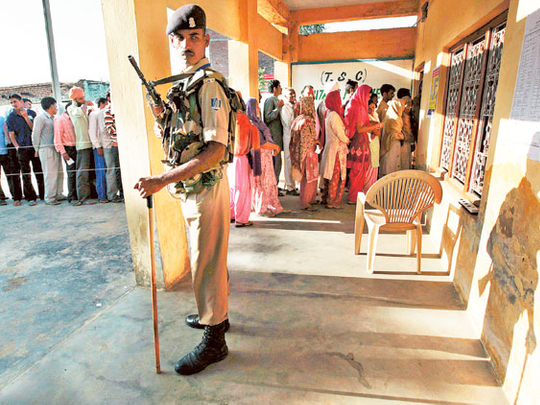
Srinagar: Although the bondage over poll-alliance between ruling coalition partners, National Conference (NC) and Congress, for electing six members out of 543 for 16th Lok Sabha from Indian administered Jammu and Kashmir apparently seems to be going smooth, deep within the corridors of reality, the shadow of uncertainty cast over the future of partnership that was so far concealed is now becoming vivid.
The reservations about whether or not to carry forward the alliance for state assembly elections, scheduled by the end of 2014, have come from none less than the senior most Congress leader Ghulam Nabi Azad, union health minister and former chief minister of state.
Ghulam Nabi Azad, who himself is contesting the elections from Udhampur-Doda constituency on Congress ticket, while speaking to a news agency recently, restricted the alliance between the two parties to parliamentary elections only. He said that it was quite premature as yet to give any opinion about the extension of alliance with NC to state assembly elections too.
While Dr Farooq Abdullah, NC president, who filed his nomination papers for most prestigious Srinagar constituency on Monday, flanked by his son and chief minister of Jammu & kashmir, Omar Abdullah, and state Congress chief Saif-U-Din Soz on the occasion, once again expressing his faith in Congress and the ties between the two getting more and more consolidated, the statement of Azad is seeming to be contradicting it.
The “statement”, that has come at a point in time, when both parties are campaigning jointly and their leadership exhibiting unity and full support for each other, is seen to have come in the backdrop of pleasing the party workers, who were not happy over the outcome of coalition with NC.
Congress workers have over the years been complaining of being neglected by Omar Abdullah led government and have on various occasions criticised the high command over entering into a coalition with NC.
Conceding the rift, state Congress chief Saif-U-Din Soz had recently come on record, saying that even though party workers may not be happy with the pre-poll alliance with NC but their reservations will not have a bad effect over its (alliance) performance in the polls.
Another and a very important factor that is believed to be behind issuing such statement is that Ghulam Nabi Azad, supposed to be enjoying a very important and strong position in Congress, both at Centre and state levels does not want his party to be restricted to the role of king maker alone and then be a bystander to let others reap the harvest of power, something that has been a concern of party cadres too.
Also the possibility of Bharatiya Janata Party (BJP) and People’s Democratic Party (PDP), whose voter percentage has considerably increased in past parliamentary elections, performing better than NC and Congress in upcoming elections, is seen to be driving Congress to revisit its policy over future poll-alliance with NC. Congress is believed to be unhappy over the performance of Omar Abdullah led coalition government, which has brought the support for both the parties in the state drastically down.
Statistics reveal that both NC and Congress lost its vote share in last assembly elections. The real gainers were the PDP and the BJP.
During last assembly elections held in 2008, National conference had secured 25 per cent of the votes polled as compared to 28 per cent it got in 2002. BJP had received a nine per cent boost in vote share in the Jammu region. The Congress went down from 24.5 per cent in 2002 to barely 20 per cent this time, with a huge vote bank loss in the Kashmir Valley. The PDP increased its vote share by seven per cent, most of it in the Kashmir Valley. PDP had got 9.28 per cent votes in 2002 assembly elections.
A lobby in state Congress, considered to be closer to Azad is holding NC and its performance as the leading party in the coalition, responsible for the mess and decline in support for Congress.
The said lobby, in order to rectify the damage caused to Congress out of the wedlock with NC is eager to see its end soon. Azad’s initial reluctance to fight the election from his home state is also believed to be out of fear of increase in BJP and PDP support, a fact that could adversely influence the results of elections for coalition.
In 2009, the NC had won three seats (in Baramulla, Anantnag and Srinagar) whereas Congress had won two seats (in Udhampur and Jammu) and independent had won 1 seat in Ladakh. Contesting parliament elections right from 1967, NC candidates made to the parliament for 22 times. This time according to political observers, every NC candidate has to face a popular PDP leader. Sitting MP Dr Mehboob Beigh of the NC will be challenged by PDP president Mehbooba Mufti, while former deputy chief minister Muzaffar Hussain Beigh will take on Sharif-u-Din Shariq. A close contest is expected between Dr. Farooq Abdullah and former finance minister Tariq Hamid Kara. This time Aam Admi Party is also in fray, while political analysts believe that it may cut votes of NC for Srinagar seat while PDP will be at receiving end in South Kashmir.
The nervousness in the NC camp after Azad’s statement is mounting as observers believe that with a possibility of losing the partnership with Congress in days to come, the party which had enjoyed victory in parliamentary election 2009 is faced with a tough contest in upcoming elections commencing, on 10th April and culminating on May 7.












